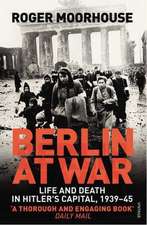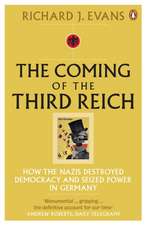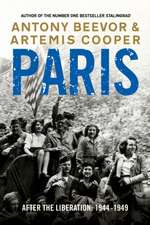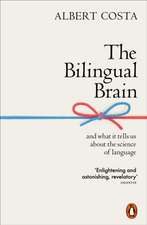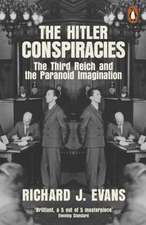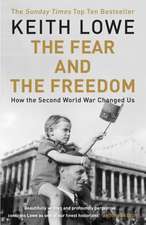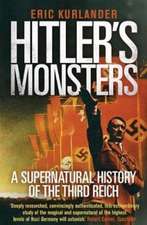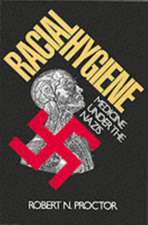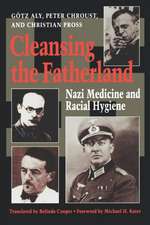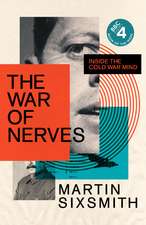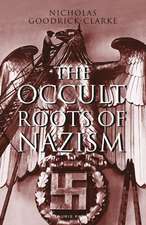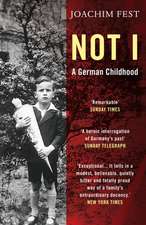They Thought They Were Free: The Germans, 1933–45
Autor Milton Mayer Cuvânt după de Richard J. Evansen Limba Engleză Paperback – 28 noi 2017
The classic, chilling account of how fascism took over Germany—and of the constant danger of complacency
“When this book was first published it received some attention from the critics but none at all from the public. Nazism was finished in the bunker in Berlin and its death warrant signed on the bench at Nuremberg.”
That’s Milton Mayer, writing in a foreword to the 1966 edition of They Thought They Were Free. He’s right about the critics: the book was a finalist for the National Book Award in 1956. General readers may have been slower to take notice, but over time they did—what we’ve seen over decades is that any time people, across the political spectrum, start to feel that freedom is threatened, the book experiences a ripple of word-of-mouth interest.
They Thought They Were Free is an eloquent and provocative examination of the development of fascism in Germany. Mayer’s book is a study of ten Germans and their lives from 1933-45, based on interviews he conducted after the war when he lived in Germany. Mayer had a position as a research professor at the University of Frankfurt and lived in a nearby small Hessian town which he disguised with the name “Kronenberg.” “These ten men were not men of distinction,” Mayer noted, but they had been members of the Nazi Party; Mayer wanted to discover what had made them Nazis. His discussions with them of Nazism, the rise of the Reich, and mass complicity with evil became the backbone of this book, an indictment of the ordinary German that is all the more powerful for its refusal to let the rest of us pretend that our moment, our society, our country are fundamentally immune.
A new foreword to this edition by eminent historian of the Reich Richard J. Evans puts the book in historical and contemporary context. We live in an age of fervid politics and hyperbolic rhetoric. They Thought They Were Free cuts through that, revealing instead the slow, quiet accretions of change, complicity, and abdication of moral authority that quietly mark the rise of evil.
“When this book was first published it received some attention from the critics but none at all from the public. Nazism was finished in the bunker in Berlin and its death warrant signed on the bench at Nuremberg.”
That’s Milton Mayer, writing in a foreword to the 1966 edition of They Thought They Were Free. He’s right about the critics: the book was a finalist for the National Book Award in 1956. General readers may have been slower to take notice, but over time they did—what we’ve seen over decades is that any time people, across the political spectrum, start to feel that freedom is threatened, the book experiences a ripple of word-of-mouth interest.
They Thought They Were Free is an eloquent and provocative examination of the development of fascism in Germany. Mayer’s book is a study of ten Germans and their lives from 1933-45, based on interviews he conducted after the war when he lived in Germany. Mayer had a position as a research professor at the University of Frankfurt and lived in a nearby small Hessian town which he disguised with the name “Kronenberg.” “These ten men were not men of distinction,” Mayer noted, but they had been members of the Nazi Party; Mayer wanted to discover what had made them Nazis. His discussions with them of Nazism, the rise of the Reich, and mass complicity with evil became the backbone of this book, an indictment of the ordinary German that is all the more powerful for its refusal to let the rest of us pretend that our moment, our society, our country are fundamentally immune.
A new foreword to this edition by eminent historian of the Reich Richard J. Evans puts the book in historical and contemporary context. We live in an age of fervid politics and hyperbolic rhetoric. They Thought They Were Free cuts through that, revealing instead the slow, quiet accretions of change, complicity, and abdication of moral authority that quietly mark the rise of evil.
Preț: 130.55 lei
Nou
Puncte Express: 196
Preț estimativ în valută:
24.98€ • 25.99$ • 20.63£
24.98€ • 25.99$ • 20.63£
Carte disponibilă
Livrare economică 24 martie-07 aprilie
Preluare comenzi: 021 569.72.76
Specificații
ISBN-13: 9780226525839
ISBN-10: 022652583X
Pagini: 384
Dimensiuni: 140 x 216 x 26 mm
Greutate: 0.47 kg
Ediția:Mărită
Editura: University of Chicago Press
Colecția University of Chicago Press
ISBN-10: 022652583X
Pagini: 384
Dimensiuni: 140 x 216 x 26 mm
Greutate: 0.47 kg
Ediția:Mărită
Editura: University of Chicago Press
Colecția University of Chicago Press
Notă biografică
Milton Mayer (1908–86) was the author of What Can a Man Do? And coauthor of The Revolution in Education. He wrote for the Progressive, Harper’s, and other outlets.
Extras
But Then It Was Too Late
"What no one seemed to notice," said a colleague of mine, a philologist, "was the ever widening gap, after 1933, between the government and the people. Just think how very wide this gap was to begin with, here in Germany. And it became always wider. You know, it doesn’t make people close to their government to be told that this is a people’s government, a true democracy, or to be enrolled in civilian defense, or even to vote. All this has little, really nothing, to do with knowing one is governing.
"What happened here was the gradual habituation of the people, little by little, to being governed by surprise; to receiving decisions deliberated in secret; to believing that the situation was so complicated that the government had to act on information which the people could not understand, or so dangerous that, even if the people could not understand it, it could not be released because of national security. And their sense of identification with Hitler, their trust in him, made it easier to widen this gap and reassured those who would otherwise have worried about it.
"This separation of government from people, this widening of the gap, took place so gradually and so insensibly, each step disguised (perhaps not even intentionally) as a temporary emergency measure or associated with true patriotic allegiance or with real social purposes. And all the crises and reforms (real reforms, too) so occupied the people that they did not see the slow motion underneath, of the whole process of government growing remoter and remoter.
"You will understand me when I say that my Middle High German was my life. It was all I cared about. I was a scholar, a specialist. Then, suddenly, I was plunged into all the new activity, as the university was drawn into the new situation; meetings, conferences, interviews, ceremonies, and, above all, papers to be filled out, reports, bibliographies, lists, questionnaires. And on top of that were the demands in the community, the things in which one had to, was ‘expected to’ participate that had not been there or had not been important before. It was all rigmarole, of course, but it consumed all one’s energies, coming on top of the work one really wanted to do. You can see how easy it was, then, not to think about fundamental things. One had no time."
"Those," I said, "are the words of my friend the baker. ‘One had no time to think. There was so much going on.’" "Your friend the baker was right," said my colleague. "The dictatorship, and the whole process of its coming into being, was above all diverting. It provided an excuse not to think for people who did not want to think anyway. I do not speak of your ‘little men,’ your baker and so on; I speak of my colleagues and myself, learned men, mind you. Most of us did not want to think about fundamental things and never had. There was no need to. Nazism gave us some dreadful, fundamental things to think about—we were decent people—and kept us so busy with continuous changes and ‘crises’ and so fascinated, yes, fascinated, by the machinations of the ‘national enemies,’ without and within, that we had no time to think about these dreadful things that were growing, little by little, all around us. Unconsciously, I suppose, we were grateful. Who wants to think?
"To live in this process is absolutely not to be able to notice it—please try to believe me—unless one has a much greater degree of political awareness, acuity, than most of us had ever had occasion to develop. Each step was so small, so inconsequential, so well explained or, on occasion, ‘regretted,’ that, unless one were detached from the whole process from the beginning, unless one understood what the whole thing was in principle, what all these ‘little measures’ that no ‘patriotic German’ could resent must some day lead to, one no more saw it developing from day to day than a farmer in his field sees the corn growing. One day it is over his head.”
"What no one seemed to notice," said a colleague of mine, a philologist, "was the ever widening gap, after 1933, between the government and the people. Just think how very wide this gap was to begin with, here in Germany. And it became always wider. You know, it doesn’t make people close to their government to be told that this is a people’s government, a true democracy, or to be enrolled in civilian defense, or even to vote. All this has little, really nothing, to do with knowing one is governing.
"What happened here was the gradual habituation of the people, little by little, to being governed by surprise; to receiving decisions deliberated in secret; to believing that the situation was so complicated that the government had to act on information which the people could not understand, or so dangerous that, even if the people could not understand it, it could not be released because of national security. And their sense of identification with Hitler, their trust in him, made it easier to widen this gap and reassured those who would otherwise have worried about it.
"This separation of government from people, this widening of the gap, took place so gradually and so insensibly, each step disguised (perhaps not even intentionally) as a temporary emergency measure or associated with true patriotic allegiance or with real social purposes. And all the crises and reforms (real reforms, too) so occupied the people that they did not see the slow motion underneath, of the whole process of government growing remoter and remoter.
"You will understand me when I say that my Middle High German was my life. It was all I cared about. I was a scholar, a specialist. Then, suddenly, I was plunged into all the new activity, as the university was drawn into the new situation; meetings, conferences, interviews, ceremonies, and, above all, papers to be filled out, reports, bibliographies, lists, questionnaires. And on top of that were the demands in the community, the things in which one had to, was ‘expected to’ participate that had not been there or had not been important before. It was all rigmarole, of course, but it consumed all one’s energies, coming on top of the work one really wanted to do. You can see how easy it was, then, not to think about fundamental things. One had no time."
"Those," I said, "are the words of my friend the baker. ‘One had no time to think. There was so much going on.’" "Your friend the baker was right," said my colleague. "The dictatorship, and the whole process of its coming into being, was above all diverting. It provided an excuse not to think for people who did not want to think anyway. I do not speak of your ‘little men,’ your baker and so on; I speak of my colleagues and myself, learned men, mind you. Most of us did not want to think about fundamental things and never had. There was no need to. Nazism gave us some dreadful, fundamental things to think about—we were decent people—and kept us so busy with continuous changes and ‘crises’ and so fascinated, yes, fascinated, by the machinations of the ‘national enemies,’ without and within, that we had no time to think about these dreadful things that were growing, little by little, all around us. Unconsciously, I suppose, we were grateful. Who wants to think?
"To live in this process is absolutely not to be able to notice it—please try to believe me—unless one has a much greater degree of political awareness, acuity, than most of us had ever had occasion to develop. Each step was so small, so inconsequential, so well explained or, on occasion, ‘regretted,’ that, unless one were detached from the whole process from the beginning, unless one understood what the whole thing was in principle, what all these ‘little measures’ that no ‘patriotic German’ could resent must some day lead to, one no more saw it developing from day to day than a farmer in his field sees the corn growing. One day it is over his head.”
Cuprins
PART 1. TEN MEN
Kronenberg
1. Ten Men
2. The Lives Men Lead
3. Hitler and I
4. "What Would You Have Done?"
5. The Joiners
6. The Way to Stop Communism
7. "We Think with Our Blood"
8. The Anti-Semitic Swindle
9. "Everybody Knew" "Nobody Knew"
10. "We Christians Had the Duty"
11. The Crimes of the Losers
12. "That's the Way We Are"
13. But Then It Was Too Late
14. Collective Shame
15. The Furies: Heinrich Hildebrant
16. The Furies: Johann Kessler
17. The Furies: Furor Teutonicus
PART II. THE GERMANS
Heat Wave
18. There Is No Such Thing
19. The Pressure Cooker
20. "Peoria Über Alles"
21. New Boy in the Neighborhood
22. Two New Boys in the Neighborhood
23. "Like God in France"
24. But a Man Must Believe in Something
25. Push-Button Panic
PART III: THEIR CAUSE AND CURE
The Trial
November 9, 1948
26. The Broken Stones
27. The Liberators
28. The Re-Educators Re-Educated
29. The Reluctant Phoenix
30. Born Yesterday
31. Tug of Peace
32. "Are We the Same as the Russians?"
33. Marx Talks to Michel
34. The Uncalculated Risk
Acknowledgements
Afterword by Richard J. Evans
Kronenberg
November 9, 1638
November 9, 1938
November 9, 1938
1. Ten Men
2. The Lives Men Lead
3. Hitler and I
4. "What Would You Have Done?"
5. The Joiners
6. The Way to Stop Communism
7. "We Think with Our Blood"
8. The Anti-Semitic Swindle
9. "Everybody Knew" "Nobody Knew"
10. "We Christians Had the Duty"
11. The Crimes of the Losers
12. "That's the Way We Are"
13. But Then It Was Too Late
14. Collective Shame
15. The Furies: Heinrich Hildebrant
16. The Furies: Johann Kessler
17. The Furies: Furor Teutonicus
PART II. THE GERMANS
Heat Wave
18. There Is No Such Thing
19. The Pressure Cooker
20. "Peoria Über Alles"
21. New Boy in the Neighborhood
22. Two New Boys in the Neighborhood
23. "Like God in France"
24. But a Man Must Believe in Something
25. Push-Button Panic
PART III: THEIR CAUSE AND CURE
The Trial
November 9, 1948
26. The Broken Stones
27. The Liberators
28. The Re-Educators Re-Educated
29. The Reluctant Phoenix
30. Born Yesterday
31. Tug of Peace
32. "Are We the Same as the Russians?"
33. Marx Talks to Michel
34. The Uncalculated Risk
Acknowledgements
Afterword by Richard J. Evans
Recenzii
“Milton Mayer’s 1955 classic They Thought They Were Free, recently republished with an afterword by the Cambridge historian Richard J. Evans, was one of the first accounts of ordinary life under Nazism. [It is} dotted with humor and written with an improbably light touch.… In 1951, he returned to Germany to find out what had made Nazism possible.… When Mayer returned home, he was afraid for his own country. He felt … that under the right conditions, he could well have turned out as his German friends did. He learned that Nazism took over Germany not ‘by subversion from within, but with a whoop and a holler.’”
"A timely reminder of how otherwise unremarkable and in many ways reasonable people can be seduced by demagogues and populists."
"Mr. Mayer's book is the fruit of a year which he passed in a German university town; it is composed of what might be called a series of meditations upon discussions which he held chiefly with ten former Nazis. Why had these men - including among them a baker, a tailor, a teacher and a policeman - become Nazis in the first place? Why had they participated in the crimes of the movement? How do they feel now after defeat and after the 're-education' of the occupying forces? Mr. Mayer's answers are sensitively worked out."
"[Mayer] wrote earnestly without an offensive earnest tone. He took stances without posturing. There is art in that."
"Among the many books written on Germany after the collapse of Hitler's Thousand Year Reich, this book by Milton Mayer is one of the most readable and most enlightening...never before has the mentality of the average German under the Nazi regime been made as intelligible to the outsider as in Mr. Mayer's report."
"Mayer is a journalist. He is also a man of convictions and a courageous man. Though he is an American, a Jew, and of German descent, he emphasizes that Nazis are--after all--human beings, that most of us have not acted very differently from most of them under comparable circumstances...Mayer's comparisons with American behavior in the matter of the deportation of Japanese citizens during the war on the one hand, in matters concerning the Jenner and McCarthy proceedings on the other, must be shamefacedly accepted."
"[Mayer] was a conscientious objector during World War II and was a leading voice in the pacifist movement."



